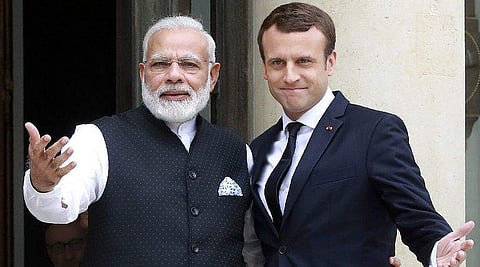

If two countries conduct joint military exercises, they constitute a pair. If five countries come together, they make a fist and convey a strategic message. The La Pérouse naval war games in the Bay of Bengal from April 5 to 7 involving France and the four ‘Quad’ members— Australia, India, Japan and the US—are stepping stones for the construct of the ‘Indo-Pacific’ to gain wider traction.
Although France’s mainland is over 8,500 km away, the fact that its naval warships are doing large-scale drills with Quad counterparts on India’s eastern maritime flank and continuing thereafter to sail to Japan via the South China Sea in a five-month-long deployment, shows that Paris is determined to project itself as ‘a State of the Indian Ocean rim’. Guided by notions of historical grandeur and a belief inherited from former President Charles de Gaulle that France can shape the world order, Macron has invested diplomatic capital to form a strategic entente with India and Australia, the two nearest regional powers to clusters of French overseas territories in the Indo-Pacific like New Caledonia, French Polynesia, Reunion and Mayotte, which face pressures and inducements from Beijing to break away from Paris and accept Chinese suzerainty.
The Australia-France-India trilateral, whose next dialogue edition is scheduled in New Delhi on April 13, is a natural outcome of France’s desire to thwart potential Chinese encroachments on French outposts. Macron’s call for a ‘Paris-Delhi-Canberra axis’ as ‘absolutely key for the region’, his dispatching of frigates and nuclear submarines to the South China Sea, the Taiwan Straits and the East China Sea in coordination with the US and Japan, and his appointment of a full-time French Ambassador to the Indo-Pacific, are unmistakable reminders to China that it will face counterbalancing resistance.
France shares with India and other Quad members concerns about ‘respect of international law by all states, in particular freedom of navigation and overflight’—diplomatic jargon for Chinese hegemonic behaviour. Still, given France’s limitations as a middle power with a raging pandemic and economic slump at home, it has championed an effort to forge an Indo-Pacific outlook for the entire EU. It has nudged Germany and the Netherlands to commit naval presence in the Indo-Pacific.
Although many Europeans have not relinquished the old concept of ‘Asia-Pacific’, a gradual reassessment is underway that it did not give due importance to India, lacked emphasis on democracy and rule of law, and was being harnessed to enable Chinese domination amid doubts about the US’s commitment to allies.
The alternative idea of the ‘Indo-Pacific’ accords with the EU’s moral compass as it envisages a rules-based multilateral order in which might is not right and authoritarianism is not the norm. President Xi Jinping’s aggressive territorial expansion and merciless crackdown on human rights in Hong Kong, Xinjiang, Tibet and mainland China itself have created a dual reality where politics and economics are going to run parallelly in determining foreign policies of nations, rather than one factor cancelling out
the other.
For Europe’s main players France, Germany and Britain, which has explicitly declared an ‘Indo-Pacific tilt’, there is a compulsion to stay ‘balanced’ in the worsening China-US ‘new Cold War’ and carry on pragmatic economic cooperation with Beijing. The announcement of the China-EU Comprehensive Agreement on Investment (CAI) in late 2020 demonstrated that the Europeans wanted to steer clear of the US hard line on China and carve out their ‘strategic autonomy’ vis-a-vis Washington.But under the effects of dual reality, Europe cannot ignore the menace of Chinese totalitarianism and territorial expansionism.
Europe’s export-oriented corporations lobbied their political leaders to ensure access to the Chinese market through the CAI, but this did not prevent the EU from imposing coordinated sanctions along with the US, UK and Canada on Chinese officials for the genocide of Uyghur minorities in Xinjiang. Chinese condemnations and counter-sanctions on the EU are unlikely to soften Europeans as moral outrage over Xi’s repression and strategic anxiety about his land-grabbing are spreading in Western public opinion and elite thinking. The CAI itself is foundering in the European Parliament, where anti-China sentiment is growing.
From a medium- to long-term lens, getting major European countries, if not the entire EU, on board the Quad express is not improbable. The Joe Biden administration’s strenuous efforts to patch up policy differences with the US’s European allies and present a united front to authoritarian adversaries will help toward this end. As long as China pursues the path of imperial conquest and promotion of an illiberal world order, one can expect Quad to evolve into ‘Quad-plus’ with other nations following France’s lead and converging around an alternative to a Sino-centric international system.
Could European disillusionment with China and alignment with the Quad inspire Asian countries like Vietnam and Indonesia, which are presently fearful of incurring economic and military backlash from China? The Association of Southeast Asian Nations (ASEAN) is intertwined with China economically much more than the EU and extremely cautious not to earn Beijing’s wrath. But the way China has progressively ratcheted up threats to their sovereignty and territorial integrity is paving the ground for some ASEAN members to associate with the Quad at least informally and loosely as an insurance policy for their security.
Economics is not everything. Self-respect and principles do matter to ordinary people and politicians. Australia, which is heavily reliant on China economically, has shown the way and is standing firm in the Quad in spite of China’s revengeful trade retaliation. Chinese propagandists are attacking the Quad and the Indo-Pacific as American colonial implants in Asia, but they would do better by introspecting why so many countries, including from distant Europe, are coalescing against China. The speed and depth of Quad-plus depends on whether or not China learns a lesson and shifts away from territorial expansionism and harsh authoritarianism. The ball is in Xi’s court.
Sreeram Chaulia
Professor and Dean at the Jindal School of International Affairs
(schaulia@jgu.edu.in)
(Tweets @sreeramchaulia)